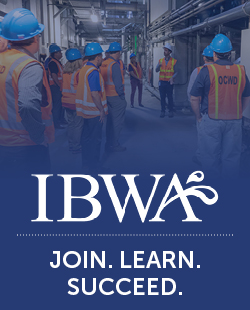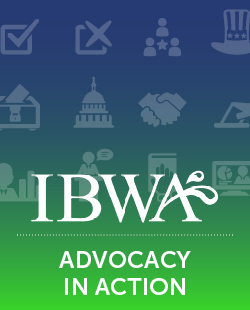IBWA Opposes Puerto Rico Bottled Water Bill
IBWA Opposes Puerto Rico Bottled Water Bill
June 21, 2002
Hon. Sixto Hernández Serrano
Chairperson
Health and Environmental Affairs Committee
Senate of Puerto Rico
El Capitolio
San Juan, Puerto Rico
Re: P. de la C. 1667
Dear Senator Hernández:
The International Bottled Water Association (“IBWA”) is the trade association representing all segments of the bottled water industry. Founded in 1958, IBWA member companies account for more than 80 percent of all bottled water sales in the United States. IBWA’s membership includes United States and international bottlers, distributors and suppliers.
IBWA has examined proposed House Bill 1667 (hereinafter referred to as “PC 1667”, by its Spanish acronym), to create the Uniform Act for the Elaboration, Bottling, Storage and Distribution of Bottled Waters in Puerto Rico. In general, IBWA fully supports these efforts to further protect the health of the citizens of Puerto Rico, based on scientific principles and industry practices, while not placing an undue burden on interstate commerce. IBWA further supports the regulation of bottled water applicable to all bottlers, whether they are locally based or located outside of Puerto Rico, in a fair and consistent manner.
IBWA respectfully submits the following specific comments on certain proposed provisions included in the above referenced bill.
Article 3, Section C(1)
The first paragraph of proposed Section C(1) would require a certificate of compliance from the local agency/authority that has jurisdiction for a bottling facility. However, the information to be included in such certificate, such as the description of source, treatment practices[1], bottling, etc., is unnecessary. IBWA respectfully recommends that the first paragraph of Section C(1) should be revised to require that all bottled water imported from the United States or abroad must provide a certificate of compliance from the agency or authority with jurisdiction in the country of origin, to the effect that the bottled water complies with the standards in effect in such country.
The last paragraph of this section would require that bottled water imported from plants located outside Puerto Rico comply with both the National Primary[2] and National Secondary[3] Drinking Water Regulations set forth in Title 40 of the Code of Federal Regulations (hereinafter, “40 CFR”), with 21 CFR Part 101 (the title number was inadvertently omitted from the bill), as well as with local regulations. IBWA respectfully objects to the requirement of compliance with the National Secondary Drinking Water Regulations, codified at 40 CFR Part 143. These secondary standards are not federally enforceable and are guidelines for the aesthetic qualities of water. Secondary standards are not health-based standards.
We respectfully submit that bottled water is already subject to regulation under the Standard of Identity and the Standard of Quality promulgated by the United States Food and Drug Administration (“FDA”). In its Standard of Quality, codified at 21 CFR § 165.110(b), the FDA adopts the National Primary Drinking Water Regulations promulgated by the United States Environmental Protection Agency (“USEPA”) that are applicable to bottled water. As required by Section 410 of the Federal Food, Drug and Cosmetic Act[4] , FDA determines, in consultation with USEPA, which national drinking water standards will be applicable to bottled water. These standards are set forth at 21 CFR § 165.110(b)(4)(iii).
Moreover, the General Environmental Health Code promulgated by the Puerto Rico Department of Health (“PRDOH”) (Regulation No. 6090) requires compliance with the FDA standards for bottled water. Specifically, the General Environmental Health Code requires that all bottled waters, both local and imported, comply with 21 CFR Part 129 with respect to processing and bottling (Article II, Section 2.01); with 21 CFR § 165.110 with respect to the standards of identity and standards of quality (Article II, Section 2.02); and with 21 CFR Part 101 with respect to labeling (Article II, Section 2.03)
Hence, IBWA respectfully suggests that the last paragraph of Section C(1) be revised to require compliance with the standards set forth at 21 CFR Part 121, Part 129 and Section 165.110. The reference to Title 40 of the Code of Federal Regulations is inapplicable and should be deleted. In the alternative, we respectfully urge this Committee to further evaluate the provisions of proposed Article 3, Section C(1) in light of possible conflicts with federal regulations which may possibly preempt the field.
Article 3, Section C(2)
This proposed section would require a sanitary license issued by the agency with jurisdiction in the country of origin. We understand that this section would be redundant, inasmuch as Section C(1) requires a certificate of compliance from the agency with jurisdiction in the country of origin[5].
Moreover, the section as currently drafted appears to require that such sanitary license include the name, telephone number and address of the distributor in Puerto Rico, as well as the distributor’s Puerto Rico license number. The license would also require that it specify the treatment method and nutritional data.
IBWA respectfully understands that the agencies with jurisdiction in the countries of origin do not require the particulars of the distributor in Puerto Rico in order to issue their license or authorization. Such information on the distributor is more adequately provided by the bottler, in a separate document. We further understand that including a particular distributor in the sanitary license may unduly hinder the bottlers’ contractual ability.
Thus, IBWA respectfully recommends that the last sentence of Article 3, Section C(2), be deleted. Information on the current distributor could be submitted by the bottler in a separate document. Nutritional data is included in the labels, copy of which we are proposing to submit as part of the certificate of compliance under Section C(1).
With respect to treatment method, we respectfully submit that requiring treatment for all bottled waters is inconsistent with FDA’s position on treatment requirements. In the FDA Bottled Water Standard of Identity, published in 1995, the agency stated:
[FDA] does not consider it necessary at this time to require disinfection of bottled water. FDA acknowledges the strict standards for bottling water that have been adopted by the European Community and by other countries, and that, when water from protected sources is bottled under strict hygienic conditions, disinfection may not be necessary. However, the agency has established microbiological quality standards in Sec. 165.110(b)(2), and bottled water that does not comply with the microbiological quality standard must be labeled with a statement of substandard quality, in accordance with Sec. 165.110(c)(1). In addition, any bottled water containing a substance at a level considered injurious to health is deemed to be adulterated regardless of whether or not the label bears a statement of substandard quality. FDA has authority to take regulatory action against such product under section 402(a)(1) of the act.
60 FR 57076, 57116 (November 13, 1995).
We further note that it may be the intent of this Honorable Legislature to require a sanitary license for imported bottled waters, issued by the PRDOH. If that is the case, IBWA respectfully recommends that the sanitary license application for imported bottled water include the following information:
1. A copy of a certificate, license, permit or a letter of compliance for the bottled water plant from the agency/authority having jurisdiction.
2. An Annual Water Quality Analysis from an approved laboratory, including the National Sanitation Foundation (“NSF”) for finished product to demonstrate compliance with CFR § 165.110(b).
3. Copy of the label for the product.
Article 3, Section C(3)(c)
This proposed section, as currently drafted, would require that each individual lot that is imported be subjected to sampling for quality. However, we must point out that quality sampling is not performed on each and every lot. According to FDA, a lot is 10 subsamples of a day’s production. This proposed section would require an enormous amount of daily quality testing for the 83 substances regulated by FDA for bottled water. This is not only cost-prohibitive, but unnecessary to protect public health. Thus, this proposed requirement will place a substantial burden on bottlers, and will make it difficult to comply with the proposed requirement as currently drafted.
IBWA suggests that quality analysis results as suggested above be submitted to the Puerto Rico Department of Health.
Article 3, Section C(3)(d)
This proposed section would require that bacteriological analyses be performed by a laboratory certified by the PRDOH. We respectfully submit that this requirement would unduly limit the analytical facilities available to waters bottled outside of Puerto Rico. It is our recommendation that the phrase “laboratory certified by the Department” be deleted and substituted with the defined term “Certified Laboratory” (“Laboratorio Certificado”), set forth in Article 2(5) of the bill. This defined term comprises not only laboratories authorized and/or certified by the PRDOH or the Puerto Rico Environmental Quality Board, but also laboratories certified by the competent regulatory authority in the pertinent jurisdiction, or certified by an independent entity accredited by the PRDOH.
IBWA wishes to thank this Committee for the opportunity to submit these comments and participate in these proceedings. We stand ready to provide any additional information that you may require with respect to these particulars. To that effect, please contact me at (703) 683-5213 ext. 108 if you have any questions or comments.
Cordially yours,
Patrick Donoho
Vice President, Government Relations
________________________________________
[1]Please note that not all bottled waters receive treatment. If the bottled water is treated by reverse osmosis, deionization, or other form of purification, it must be clearly labeled as “reverse osmosis water”, with the blank being filled in with one of the defined terms describing the water (e.g., “purified drinking water” or “deionized drinking water”). 21 CFR § 165.110(a)(2)(iv). Furthermore, and as will be discussed in more detail, requiring treatment for all bottled waters is inconsistent with FDA’s position on treatment requirements.
[2]Codified at 40 CFR Part 142.
[3]Codified at 40 CFR Part 143.
[4]Said Section 410 provides that FDA must determine, within 180 days of the implementation of a USEPA primary drinking water standard, the standard’s applicability to bottled water. If FDA takes no action, then the USEPA standards will apply to bottled water.
[5] We further note that such agencies may not necessarily issue a “sanitary license.”


